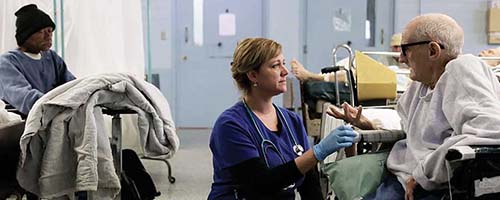
Facts about Correctional Nursing
Common misconceptions have deterred potential correctional nurses from exploring the specialization thoroughly. The fact is that correctional nurses often have more professional freedom, earn higher salaries, receive impressive benefits packages and reach management levels faster than many other types of nurses.
Since the stigma of working in a prison or jail is so prevalent, institutions are forced to pay top dollar to attract qualified nurses. This has lead to steady increases in salary since medical care was mandated in correctional facilities by the U.S. supreme court.
The registered nurse interested in the general specialization of correctional nursing still has a myriad of options within that specification. Many nurses choose to work with a certain client population, disease, or patient care setting.
Also, many nurses are intrigued by the professional freedom and autonomy that are afforded by this career. RNs are typically hired to work independently of any physician. Of course, this added independence requires a better qualified nurse. But for the independent-minded, this makes correctional nursing a fantastic opportunity.
Risks of Correctional Nursing
Acting as a nurse within a correctional facility comes with inherent risks. By working with the worst element in society on a daily basis, the threat of violence is increased. However, security is paramount in correctional facilities. Various safety measures are in place, which has made actual incidents a rare occurrence.
Also, the correctional nurse must always remember that the clients are patients first. The fact that they are also criminals must not interfere with proper procedure and common courtesy.
Challenges Facing Correctional Nurses
- Complicated medical histories; often criminals have never had formal healthcare.
- Moral issues in treating and improving the health of certain types of criminals.
- Higher levels of hepatitis, TB, HIV/AIDS and other infectious diseases.
Benefits of Correctional Nursing

The vast majority of correctional nurses report that the benefits far outweigh the challenges and risks. However, the benefits are seldom mentioned since misconceptions are so prevalent. Here are a few of the most common benefits:
- Professional freedom
- Daily challenges, both with patients and health conditions
- High salaries
- Lucrative benefit packages
- Job security
Degrees and Program Credentialing
The National Commission on Correctional Health Care recommends that all correctional nursing candidates attain the following certifications:
- An ADN, Bachelor’s in Nursing or Master’s in Nursing is considered a prerequisite.
- The Certified Correctional Health Professional certification (CCHP) – A general certification that assures that nurse has the clinical skill set necessary for working within a correctional environment.
- Advanced Certified Correctional Health Professional certification (CCHP)- A certification which tests the nurses education level and on the job experience. Administrative competence is the primary focus.


